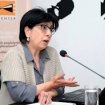Russia and the Karabakh Conflict – 2018: Page 4 of 6
Karabakh conflict.
Emin Ahmedbekov - Everything that has happened in Armenia in the recent months, has caused a lot of anxiety among the rulers of Azerbaijan. Against this background, stronger pressure has started to be put on the civil society in Azerbaijan, and Moscow largely supports this.
Stepan Grigoryan - Indeed, in Russia they are quite wary of the changes in our countries. Moscow has a fear that democratic changes in our countries can alienate us from Russia. But I very often cite the example of Finland. This country of classical democracy used to be a part of Tsarist Russia. So what? Doesn’t Russia cooperate with this country? I can assure you that there is a multilateral and deep cooperation. Even now, when the EU is applying serious sanctions against Russia! That is to say, in Russia, over time, they should understand the inevitability of strengthening sovereignty in our countries and should not be afraid of it. Whereas the making of a mutually beneficial cooperation will eliminate the danger for Russia to lose our countries. Russia's tougher policy towards our countries can lead to the opposite effect.
Laura Baghdasaryan : Russia’s behavior in the case of Karabakh is definitely stands out as exclusively different from Russia's position in the other conflict zones of the post-Soviet space. In April 2016 Russia reacted extremely reservedly to the unfolding of the four-day war by Azerbaijan, whereas in August 2008 it not only severely repulsed the offensive of the Georgian troops, but also recognized the independence of South Ossetia and Abkhazia. In the Ukrainian case Russia is in favor of a direct dialogue between Kiev and Donbas, but Pashinyan's statement about the need for talks not with Armenia, but with the NKR, was treated with callous indifference, we can say was not reacted to at all. And I think, not only because Russia is the mediator of the OSCE Minsk Group, but also because the priorities in the relations with Armenia and Azerbaijan do not dovetail in any way, except in one thing - how to bind these countries to Russia as tighter as possible: Armenia – from the point of view of security guarantees, and Azerbaijan - from the point of view of the strengthened energetic component.
Stepan Grigoryan - Regarding R. Kocharyan’s (ex-president of Armenia, 1998-2008 - Ed.) factor. Of course, he did not plan to enter politics. However, when the new Armenian authorities started investigating the events of March 1, 2008 seriously (then ten people were killed during the protest rallies of the opposition, and hundreds of politicians were imprisoned afterwards), it turned out that R. Kocharyan's guilt was serious and he was arrested last August. Of course, R. Kocharyan understood that the best way to avoid punishment for shooting at the participants of peaceful rallies was to engage in politics. Well, the Russian government "took advantage of this", because in the Kremlin they are not accustomed to the Armenian leaders acting on an equal footing (which Nikol Pashinyan is trying to do). That is to say, the obvious support to R. Kocharyan







 +37410 563363
+37410 563363
 ул. Бузанда 1/3, 8-й этаж, Ереван, Армения
ул. Бузанда 1/3, 8-й этаж, Ереван, Армения